|
|
|
Sort Order |
|
|
|
Items / Page
|
|
|
|
|
|
|
| Srl | Item |
| 1 |
ID:
076891
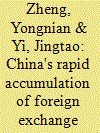

|
|
|
|
|
| Publication |
2007.
|
| Summary/Abstract |
In late February 2006, China surpassed Japan to become the world's largest holder of foreign exchange reserves. Beijing is now faced with the growing challenge of how to handle these vast reserves effectively. Although China's soaring foreign exchange reserves indicate that its overall strength has grown, they have created internal and external pressures on the balance of the economy, and introduced risks to the financial system. It is estimated in the present study that foreign exchange reserves of approximately US$ 400bn in 2005 would have been appropriate under circumstances of a managed floating exchange rate regime and capital control. China's actual reserves have far exceeded its normal demand. The objective of China is to maintain an optimal level that maximizes net benefits as a whole. Four main policy options are available for China to achieve its target: spending and investing foreign exchange reserves, gradual liberalization of the capital account, diversification of foreign exchange reserves and a switch in holders of foreign exchange reserves. Spending and investing in foreign exchange reserves can be undertaken in combination with liberalization in the capital account, given careful consideration of the risks involved. Liberalization should be extensive but gradual so that companies and individuals can adjust to changes in financial markets and manage portfolios while avoiding unnecessary risks.
|
|
|
|
|
|
|
|
|
|
|
|
|
|
|
|
| 2 |
ID:
152887
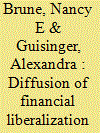

|
|
|
|
|
| Summary/Abstract |
Over the past three decades, many developing countries have liberalized their capital accounts. Recent studies suggest that these policy changes were interdependent and diffused through networks of peers. This article strengthens the literature on the diffusion of financial liberalization in several ways. Theoretically, we distinguish between concrete and more amorphous causal processes by which policies are diffused. We argue that networks vary by degree of interdependence, structure, and self-selection and hypothesize that diffusion of liberalization policies is more likely across networks that are more structured, interdependent, and self-selected, such as regional integration agreements (RIAs). Empirically, we employ both an aggregate measure of openness as well as a policy-to-policy measure of capital control transmission. Based on panel data for 114 emerging economies over 1973–2002, we replicate the finding of multiple diffusion processes using the aggregate measure, but find these results are substantially weaker using the policy-to-policy measure. Of all the networks tested, RIA networks were the most robust to different models and measurement.
|
|
|
|
|
|
|
|
|
|
|
|
|
|
|
|
| 3 |
ID:
093335


|
|
|
| 4 |
ID:
168358


|
|
|
|
|
| Summary/Abstract |
The proposed income distribution effect of financial liberalization has gradually attracted the attention of academic economists, but the research results are inconsistent and even contradictory. This paper presents a quantitative review of these studies. The objectives are to assess the impact of financial liberalization on income inequality and to identify the sources of heterogeneity. A meta-analysis is performed with 23 empirical cross-country studies on the relationship between financial liberalization and income inequality, yielding a total of 556 estimates. We find overall support for the small negative relationship between financial liberalization and income inequality when considering potential publication bias and method heterogeneity. Our results suggest that different impact channels, institutional quality, the measurement used for financial liberalization and income inequality, and the use of different econometric methods are especially effective for explaining the differences in past study findings.
|
|
|
|
|
|
|
|
|
|
|
|
|
|
|
|
| 5 |
ID:
178564
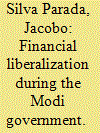

|
|
|
|
|
| Summary/Abstract |
Financial liberalization has been a gradual, calibrated and uneven process in India. Since the early 90s, Indian financial system has been transformed in accordance with a market-led economic strategy aiming to attract foreign investments and prepare its integration into the international financial circuits, through institutional changes, regulatory easing, public monopolies ending, etc. A few years after the 2008 global financial crisis, during the Modi government, the financial liberalization process has been significantly renovated and reinforced. In addition, old and new challenges have been (re)emerged, and domestic and external factors also have had considerable impacts by unveiling and aggravating systemic fragilities. In this context, the objective of this article is to analyze the financial deregulation process and its political and economic implications for India in the course of Modi’s first government, in view of the foreign investments, the banking system, the insurance sector and the monetary policy.
|
|
|
|
|
|
|
|
|
|
|
|
|
|
|
|
| 6 |
ID:
117804


|
|
|
|
|
| Publication |
2012.
|
| Summary/Abstract |
This article explores the consequences of financial liberalization policy on the banking sector in Bangladesh. Following a motivating portfolio selection theor-etical model on the impact of liberalization, it applies time series techniques with annual banking sector data for the period 1981-2008. The study suggests that the main objective of financial liberalization to promote domestic private savings by raising real interest rates has not worked. No significant positive correlation is observed between domestic private savings and the real deposit interest rate.
|
|
|
|
|
|
|
|
|
|
|
|
|
|
|
|
| 7 |
ID:
112734
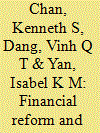

|
|
|
|
|
| Publication |
2012.
|
| Summary/Abstract |
This paper examines the impact of recent financial reforms in China on the financing constraints and investment of publicly-listed Chinese firms. Two continuous indices are constructed to measure the evolution and intensity of financial reforms: a financial liberalization index and a capital control index. Dynamic panel GMM method is used to estimate firms' financing constraints in an Euler-equation investment model. Based on panel data of listed firms for 1996-2007, we find that large firms face no credit constraints and smaller firms display significant constraints. However, the sensitivity of large firms' investment to their cash holdings is heightened as more financial reforms take place. It appears that reforms that gradually eliminate preferential treatments to large firms, primarily state-owned enterprises (SOEs) in China, have subjected these firms' investment decisions to stricter market-based discipline and therefore raised their financing constraints. No significant change in the financing constraint is detected for smaller firms in China. This is interpreted as financial reform in China has not been substantial enough for its benefits to reach smaller firms.
|
|
|
|
|
|
|
|
|
|
|
|
|
|
|
|
| 8 |
ID:
160454
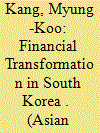

|
|
|
|
|
| Summary/Abstract |
This paper addresses why and how South Korea’s financial system has diverged drastically from the Japanese model since the early 1980s and has turned to the US model, which is often regarded as a more market-oriented financial system. The paper traces the rise of American-trained Korean economists in the Economic Planning Board and their collaboration with other such economists in public and private economic institutes and academia.
|
|
|
|
|
|
|
|
|
|
|
|
|
|
|
|
| 9 |
ID:
113044
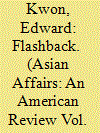

|
|
|
|
|
| Publication |
2012.
|
| Summary/Abstract |
This paper investigates financial liberalization in Mexico and South Korea from a comparative international political economy perspective. Though the two countries have a different political economy background, their experiences with financial repression and liberalization were similar, as was the manner in which they handled the subsequent huge inflow of capital. During the process of financial liberalization, both governments had their policy autonomy undermined by strong domestic interest groups as well as by influential international actors. Similar situational effects also prevailed during these two countries' financial crises: both experienced surges of international financial capital, had presidential elections during the crisis, and joined the OECD around that time. This paper sheds light on how the two countries experienced macroeconomic imbalances and financial crisis as a result of financial liberalization. The experience suggests meaningful lessons for other developing countries regarding the policy dilemmas that can arise from financial liberalization.
|
|
|
|
|
|
|
|
|
|
|
|
|
|
|
|
| 10 |
ID:
139257
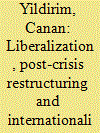

|
|
|
|
|
| Summary/Abstract |
This study provides a historical review of the transformation of the Turkish banking sector since the initiation of the financial liberalization program in 1980. It demonstrates the roles of macroeconomic, institutional and firm-level factors in the evolution of market and ownership structures as well as the performance of the sector. It focuses on the penetration of foreign banks in the Turkish market and the more recently observed entries of Turkish banks into neighboring countries. It contributes to the literature by illustrating how the domestic macroeconomic and institutional environment together with international banking circumstances affect the processes and outcomes of internationalization in emerging banking markets.
|
|
|
|
|
|
|
|
|
|
|
|
|
|
|
|
| 11 |
ID:
093008
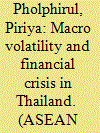

|
|
|
| 12 |
ID:
088388


|
|
|
|
|
| Publication |
2009.
|
| Summary/Abstract |
This paper studies the political economy of financial liberalization in Korea. We highlight the primary importance of state intervention in promoting financial liberalization. We shed light on "power games" of state, big business, and foreign investors emerging in state-led financial liberalization, and their impact on the Korean economy.
|
|
|
|
|
|
|
|
|
|
|
|
|
|
|
|
| 13 |
ID:
092638
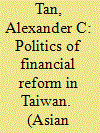

|
|
|
| 14 |
ID:
094659
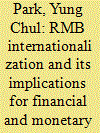

|
|
|
|
|
| Publication |
2010.
|
| Summary/Abstract |
This paper emphasizes the importance of the denomination of financial assets rather than trade invoicing as a long-term determinant of an international currency. China needs to liberalize and open its financial system and make the RMB fully convertible, and to adopt a more flexible exchange rate system to speed up its currency internationalization, for which China could follow either a global or regional approach. The global approach is a riskier and more unpredictable strategy because it would demand a scope and timeframe of financial liberalization that is likely to be beyond China's institutional capacity over the coming decade. There are two options that could be taken in following the regional approach. One is creating an ASEAN+New 3 (the Chinese Mainland, Hong Kong, and Taiwan) RMB bloc and the other is liberalizing China's financial industries and internationalizing the RMB by playing a leading role in East Asia's economic integration within the framework of ASEAN+3. This paper concludes that the latter is a more realistic and effective approach for China.
|
|
|
|
|
|
|
|
|
|
|
|
|
|
|
|
|
|
|
|
|